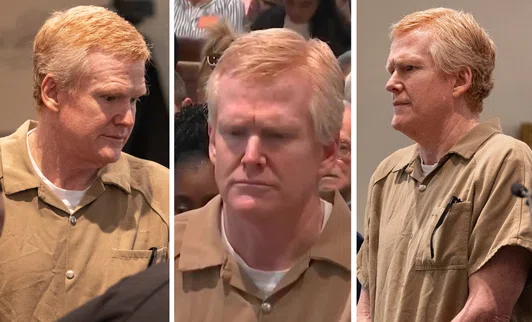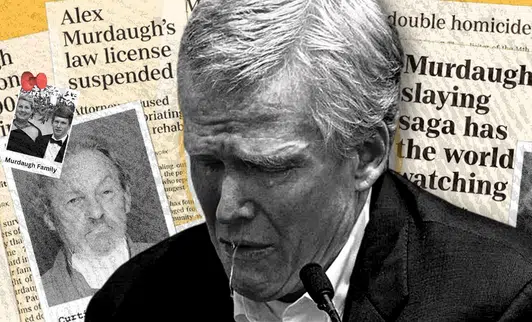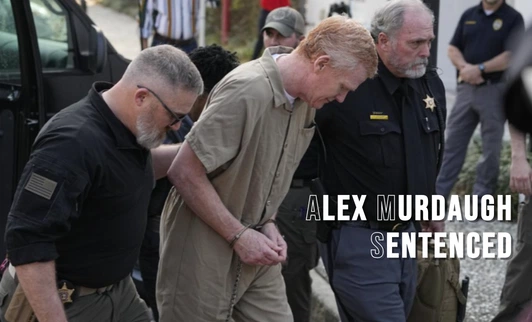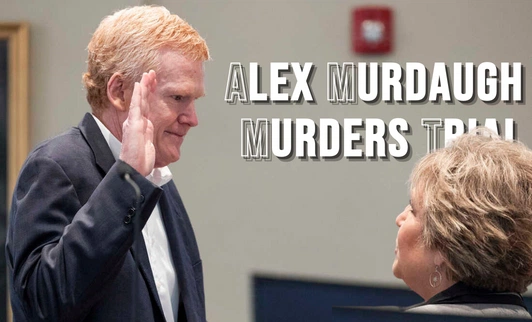With his family’s legal pedigree in coastal South Carolina dating back to the early 1900s, convicted former attorney Alex Murdaugh’s choice to testify during his double murder trial was not altogether shocking.
Nevertheless, legal experts believe it was an expensive strategy for the scion of the well-connected Murdaugh clan, who fought crime for three generations in the state’s rural low country.
“As a talented attorney, I assume he felt he could outwit the jury,” said Areva Martin, an attorney and legal affairs analyst.
One week after spending hours on the witness stand attempting to persuade a jury of his innocence, Murdaugh, 54, was sentenced to life in prison without the chance of parole for the murders of his wife and son.
Related: Alex Murdaugh was convicted guilty of murdering his wife and son, ending a dynasty

“He was required to testify. “There were just too many falsehoods,” said CNN legal expert Joey Jackson on Saturday. “Clearly, the jurors thought he was deceiving them.”
Murdaugh’s most egregious deception was denying for a year and a half that he was anywhere near his wife, Maggie, and 22-year-old son, Paul, when they were fatally shot on the family’s Islandton farm on June 7, 2021.
Murdaugh testified that he did not murder them but discovered their dead after returning from a quick visit to his ailing mother that night.
Paul Murdaugh, who filmed a video seconds before being fired down and murdered, provided crucial evidence. It depicted a family dog beside the property’s kennels. It also recorded his father’s voice in the background, putting Alex Murdaugh at the murder scene.
Murdaugh’s alibi was destroyed by the video, which he was unaware of prior to the trial. The veteran attorney took the stand in a courtroom where a photograph of Murdaugh’s grandpa hung before the trial. He attempted to explain why he lied about his whereabouts.
“He had never faced responsibility in his life and had always been able to avoid it – and that was more important to him than anything,” said lead prosecutor Creighton Waters.
“That’s why I was always confident he’d testify in this case. That he would be able to argue his way out of it one more time. Not quite out of the woods, but he can surely talk his way out of this. Evidently, the jury viewed things differently.”
‘A competent liar, but not good enough.’
Within moments of taking the stand, Murdaugh admitted that his voice can be heard in the video that appeared to be taken at the dog kennels where the bodies were discovered and that he lied to investigators about being there earlier that evening due to “paranoid thinking” caused by his drug addiction.
Many witnesses recognized Murdaugh’s voice in the background of the video footage throughout the trial. Yet Murdaugh was insistent that he “didn’t shoot my wife or my kid. “At any moment. Ever.”
Related: Judge sentences Murdaugh to life in prison for his ‘lies.’

Craig Moyer, a juror who assisted in Murdaugh’s conviction on Thursday, told ABC News that the panel took less than an hour to make a unanimous verdict.
The video was essential.
“I could plainly hear his voice,” Moyer told ABC. “And so might everyone else.”
Murdaugh was “a good liar,” but not “good enough,” according to Moyer.
Moyer told ABC that he saw “no genuine regret or sympathy” from Murdaugh. Murdaugh “didn’t weep” on the stand, according to Moyer. “He did nothing except blow snot.”
Waters said he just wanted Murdaugh to speak during cross-questioning. And he did it.
“We have to keep in mind that this person is an accomplished lawyer,” Waters added. “He’s a part-time assistant solicitor with a family history of prosecution dating back 100 years… I got the impression he thought he could look at that jury and truly persuade them. But I believed that if I got him talking, he’d ultimately lie, and they’d be able to watch it in real-time.”
Murdaugh has always wanted to testify.

The decision to allow Murdaugh to testify was justified, according to defense counsel Dick Harpootlian, since his credibility was called into doubt due to financial wrongdoings. He said that the defense team intends to file an appeal within 10 days after the judgment.
Murdaugh faces 99 counts in a separate case that has not yet gone to trial for a series of alleged financial crimes, including cheating his clients, previous legal company, and the government of millions of dollars.
Related: Alex Murdaugh is shown in videos wearing two different shirts on the night of the killings
“After they heard that character information – ‘he’s a thief, he’s a liar,’ this jury had to think he’s a nasty human being, and not to be trusted,” Harpootlian told reporters following the sentence, alluding to evidence regarding financial crimes revealed during the murder trial. Murdaugh, he claimed, has always wanted to testify.
Harpootlian told CNN that it was “inexplicable” that he would “kill his kid and his wife in that manner.”
Another defense attorney, James Griffin, said that placing Murdaugh on the witness revealed to the jury his client’s “emotions towards Maggie and Paul, which are extremely raw and true.”
‘He simply couldn’t stop himself.’
Nonetheless, placing Murdaugh on the witness, according to legal experts, was a hazardous choice.
“His evidence was appalling. In fact, I believe it was borderline heinous,” jury consultant Alan Tuerkheimer told CNN. “Jurors dislike it when witnesses are questioned and do not respond, and what he kept doing was going outside the subject of the questions.”
Tuerkheimer went on to say that Murdaugh “continued attempting to inject his own story. He was elusive, and I believed he prevaricated a lot, and his evidence was self-serving, which juries dislike. While he was being pushed, he should have given rapid yes or no replies.”
Tuerkheimer also questioned Murdaugh’s efficacy in referring to his late wife and son as “Mags” and “Paul Paul.”
“It’s effective if it’s sincere, and it simply didn’t come across that way. Lawyers, after all, like testifying. Words are used to convince others. “He simply couldn’t control himself once he was on the stand,” Tuerkheimer said of Murdaugh.
“And when he used such expressions to endear himself to the jury, they simply didn’t believe it was genuine. They rejected it, and he was forced to testify as a last-ditch effort. And, like most Hail Marys, it failed.”
Related: Alex Murdaugh was Sentenced to Life without parole for killing his wife and son

Murdaugh was convicted of two counts of murder in the June 2021 deaths, as well as two charges of possession of a weapon during the commission of a violent felony, by a jury on Thursday, after more than a month and dozens of witnesses.
The following day, after his sentence, Murdaugh was led out of a courtroom that had epitomized his family’s legacy of power and privilege in the area, wearing a brown jumpsuit and handcuffs.
- 2026 Winter Olympics Locations: Amazing Guide to Milano Cortina
- Bryan Kohberger: Idaho Murders Uncovered
- ‘It’s Perplexing. It’s Painful’: Kohberger Sister Breaks Silence in NYT Interview
- In the Idaho Murders, Her Brother Admitted Guilt. Now Bryan Kohberger Sister Speaks
- George Kittle Injury Update: George Kittle Unlikely to Play in Crucial 49ers-Bears Clash
“The potential of persuading one or two jurors that he could be a liar, a thief, but he’s not a murderer was worth taking that risk,” defense attorney Misty Marris told CNN on Saturday. “But, in my perspective, it was the testimony that did him in.”
